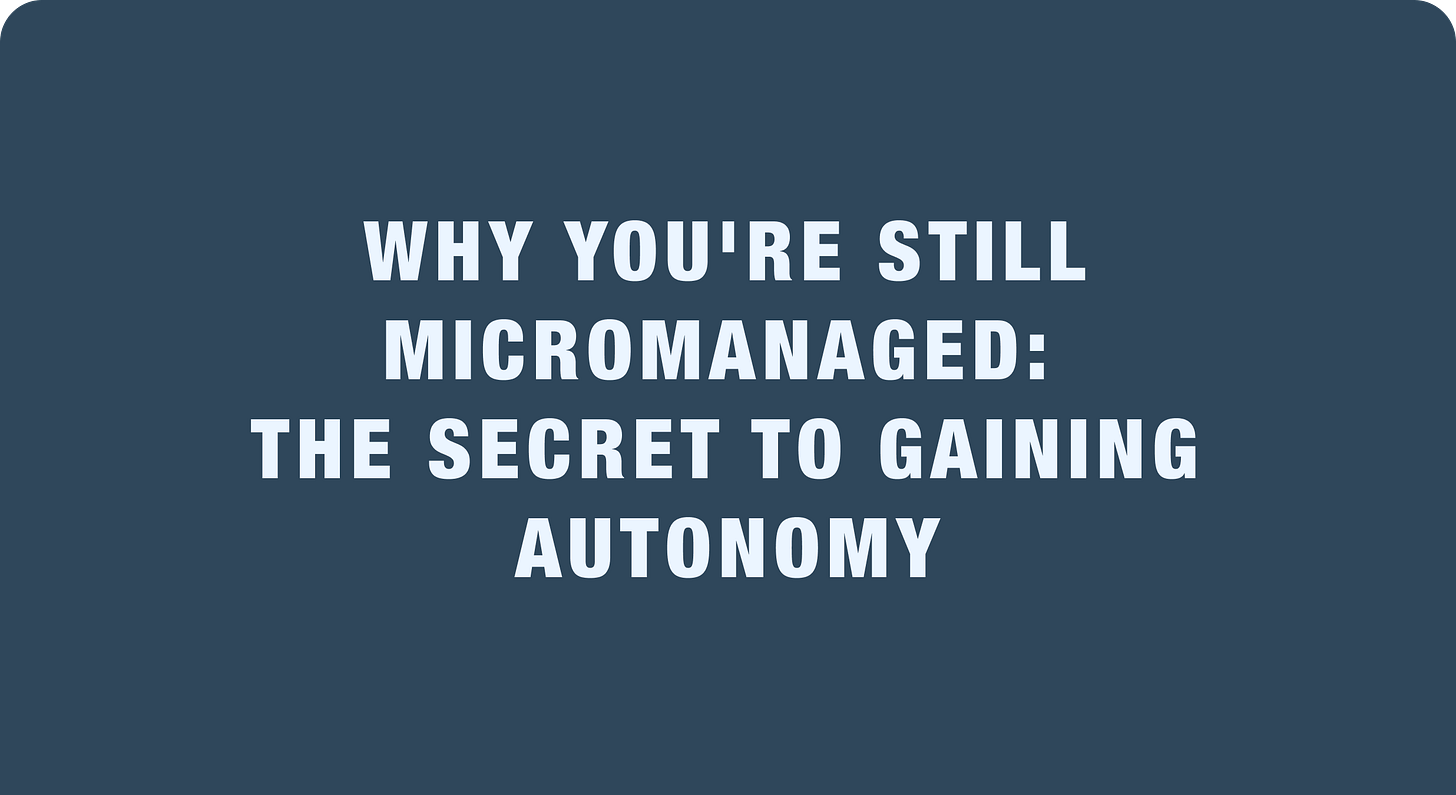Why You're Still Micromanaged: The Secret to Gaining Autonomy
How to control your schedule and do ridiculously good work
I used to think that I needed to be my own boss. That I couldn’t work for someone my whole career because I always rubbed against people above me.
I thought I was independent, and being an entrepreneur would “free my soul”
Now I know I was wrong. I just had a bad executive presence and unrefined skillsets. Without those things, you are setting yourself up for micromanagement.
Turns out, that having the soft skills to manage stakeholder expectations and being competent at your job impresses people. Turns out that the “micromanaging” boss just needed someone that was reliable, executed well, and was a good communicator.
All of a sudden you are given a ton of lateral to run your own schedule and plan how you do work. While still making the money you dreamed of as a solo entrepreneur.
Which is what I wanted all along in the first place. I just wanted to be a respected operator in my field.
When I say operator, I mean someone who is capable of self-managing, even though they are employed, they are still their own boss. This requires a strong mastery of the operator’s chosen profession and a strong executive presence when working with customers.
How do you get to this point of becoming an operator?
In this article, I’ll discuss the first steps:
Improving Executive Presence
You will never be in control of your day-to-day until you start treating everyone like a customer.
The paradigm shift from micromanaged employee to becoming an operator isn’t your tax status—even though that is something you should consider if you do your own thing. It really isn’t about having an LLC, C-Corp, S-Corp, or legal business entity.
It’s how you view your contributions to the world.
The first step is believing that no matter what, you will always have to answer to someone.
Doesn’t matter if you are employed, self-employed, or a business owner, everyone has a boss. CEOs report to a board, self-employed doctors are held accountable by their patients, and business owners are accountable to their customers and employees.
No matter what you do to be more “free” you will always answer to someone.
The belief that there is accountability and karma in the world of business is why A-players thrive.
Those that feel like they don’t have to explain themselves, their process, or decisions are B-players. Taking the extra time to clearly communicate their vision, strategy, and tactics is below these people, they just want to be told what to do. They become a black box.
The problem with being a black box is that you are untrustworthy, and are basically begging to get more oversight on your day-to-day.
The way to get out of this is by treating the people you work with as customers. They need outcomes from you and you should ensure they feel like you are pulling your weight. They need to feel like they don’t need to worry about you.
This means taking the extra time to make a communications deck explaining your reasoning, writing a written narrative memo highlighting your thought process, and getting better at storytelling the value adds of the next release you are working on.
Operators understand how to manage expectations through preparation and transparent, well-crafted communication.
Pro-Tip
For me taking the Chris Voss negotiation course in masterclass and studying his books and material was the best training on expectation management I have gotten so far.
High performance is about taste.
To become an operator, focus on mastering your role first. Stop trying to become a fancy generalist. Nobody likes an ideas guy/gal.
In Robert Greene’s book “Mastery” his premise is that masters of their craft are superb tastemakers. They experiment and refine their skillset over obsessive practice over time. Taste comes from exploring different modes of execution and developing a personal style.
Steve Jobs talks about “looking at the best” mankind has created and applying those things to their work. He said the Macintosh team was a group of poets, philosophers, and artists who “happened to be great computer scientists”. The Macintosh team treated computer science as a liberal art and didn’t define themselves by the profession.
Most employees are given broad tasks and desired outcomes. What operators have over the B-Player is mastery of their craft, they know all the rules and have developed a taste in when those rules can be broken. If you don’t have a taste of how to execute the design, you are probably going to follow a generic design process.
If this is how you design, then you might still need an extra pair of eyes to manage you.
I didn’t get more valuable as a designer until I mastered the core skillsets of my role. For me, it was investing 1k and spending 6 months practicing and being coached by Matt D. Smith on improving my gaps in UI design. I doubled my income within a couple of years of doing the Shift Nudge course. Turns out a strong command of visual communication and UI is a valuable skill set in the industry!

